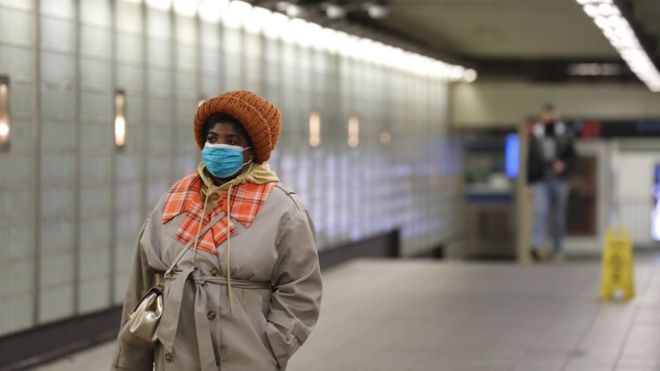The state of New York has ordered staff at all "non-essential" businesses to remain at home as the number of coronavirus cases continues to rise.
The move expands earlier restrictions and comes as California on the west coast said its nearly 40 million residents should "shelter in place".
The US has confirmed more than 14,000 cases of the coronavirus, including more than 7,000 in New York.
The surge has started to strain its health care system.
"This is the most drastic action we can take," New York Governor Andrew Cuomo said,
New York said pharmacies, grocery stores, banks and shipping firms were among those exempt from the order, which goes into effect on Sunday.
Many places have already been forced to shut, including schools, shopping centres, and theatres.
Mr Cuomo also issued additional rules for the state's 8.6 million citizens, saying healthy people who are not at risk may go outside for exercise and to go grocery shopping, but should otherwise remain at home.
Dr Anthony Fauci, the director of the National Institute of Allergy and Infectious Disease, who has been a leader of the national response, said he supported the move.
"Please co-operate with your governor," he said at the White House's daily coronavirus briefing.
The US also said it would bar non-essential travel between the US and Canada, from midnight.
However, US President Donald Trump said he did not think shelter in place orders needed to be expanded nationally, noting that many states have far lower infection rates.
"They're watching it on television but they don't have the same problems," he said.
Restrictions aimed at reducing the spread of the coronavirus have expanded rapidly this week and are already having a devastating economic effect, with the number of Americans seeking unemployment benefits surging more than 30% this week.
Economists are predicting a sharp contraction in economic growth in coming months, and have warned that millions of jobs are at risk.
Congress is working on a more than $1tn relief bill, that is expected to include direct payments of more than $1,000 for each American who earns less than a certain amount. It would also include millions for businesses affected by the pandemic, such as airlines and hotels.
Latest Stories
-
Queenmother calls on President-elect Mahama to appoint more women in his government
34 minutes -
Atletico Madrid beat Barcelona to go top of La Liga
52 minutes -
Usyk breaks Fury’s heart with points win in rematch
54 minutes -
Ghana-Russia Centre to run Russian language courses in Ghana
6 hours -
The Hidden Costs of Hunger: How food insecurity undermines mental and physical health in the U.S.
7 hours -
18plus4NDC marks 3rd anniversary with victory celebration in Accra
10 hours -
CREMA workshop highlights collaborative efforts to sustain Akata Lagoon
10 hours -
2024/25 Ghana League: Heart of Lions remain top with win over Basake Holy Stars
11 hours -
Black Queens: Nora Hauptle shares cryptic WAFCON preparation message amid future uncertainty
11 hours -
Re-declaration of parliamentary results affront to our democracy – Joyce Bawah
11 hours -
GPL 2024/25: Vision FC score late to deny Young Apostles third home win
12 hours -
Enhancing community initiatives for coastal resilience: Insights from Keta Lagoon Complex Ramsar Site Workshop
12 hours -
Family Health University College earns a Presidential Charter
12 hours -
GPL 2024/25: Bibiani GoldStars beat Nsoatreman to keep title race alive
12 hours -
GPL 2024/25 Bechem United keep title hopes alive with narrow win over FC Samartex
12 hours

